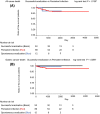Early detection of gastric cancer after Helicobacter pylori eradication due to endoscopic surveillance
- PMID: 29924436
- PMCID: PMC6055630
- DOI: 10.1111/hel.12503
Early detection of gastric cancer after Helicobacter pylori eradication due to endoscopic surveillance
Abstract
Background: Helicobacter pylori eradication therapy is commonly performed to reduce the incidence of gastric cancer. However, gastric cancer is occasionally discovered even after successful eradication therapy. Therefore, we examined the prognosis of gastric cancer patients, diagnosed after successful H. pylori eradication therapy.
Materials and methods: All-cause death rates and gastric cancer-specific death rates in gastric cancer patients who received successful H. pylori eradication treatment was tracked and compared to rates in patients who did not receive successful eradication therapy.
Results: In total, 160 gastric cancer patients were followed-up for up to 11.7 years (mean 3.5 years). Among them, 53 gastric cancer patients received successful H. pylori eradication therapy prior to gastric cancer diagnosis. During the follow-up period, 11 all-cause deaths occurred. In the successful eradication group, the proportion of patients with cancer stage I was higher. The proportions of patients who received curative endoscopic therapy and endoscopic examination in the 2 years prior to gastric cancer diagnosis were also higher in the successful eradication group. Kaplan-Meier analysis of all-cause death and gastric cancer-specific death revealed a lower death rate in patients in the successful eradication group (P = .0139, and P = .0396, respectively, log-rank test). The multivariate analysis showed that endoscopy within 2 years before cancer diagnosis is associated with stage I cancer.
Conclusions: Possible early discovery of gastric cancer after H. pylori eradication due to regular endoscopic surveillance may contribute to better prognosis of patients with gastric cancer.
Keywords: H. pylori eradication; endoscopic surveillance; gastric cancer; mortality rate.
© 2018 The Authors. Helicobacter Published by John Wiley & Sons Ltd.
Figures

References
-
- Uemura N, Okamoto S, Yamamoto S, et al. Helicobacter pylori infection and the development of gastric cancer. N Engl J Med. 2001;345:784‐789. - PubMed
-
- Sakitani K, Hirata Y, Watabe H, et al. Gastric cancer risk according to the distribution of intestinal metaplasia and neutrophil infiltration. J Gastroenterol Hepatol. 2011;26:1570‐1575. - PubMed
-
- Shichijo S, Hirata Y, Sakitani K, et al. Distribution of intestinal metaplasia as a predictor of gastric cancer development. J Gastroenterol Hepatol. 2015;30:1260‐1264. - PubMed
-
- Van Cutsem E, Sagaert X, Topal B, Haustermans K, Prenen H. Gastric cancer. Lancet. 2016;388:2654‐2664. - PubMed
MeSH terms
Substances
LinkOut - more resources
Full Text Sources
Other Literature Sources
Medical

